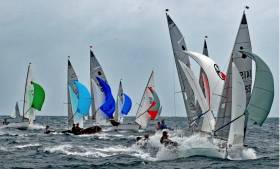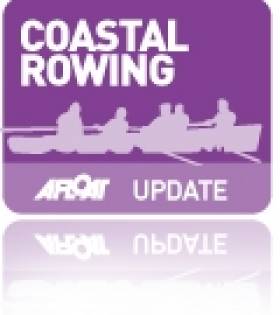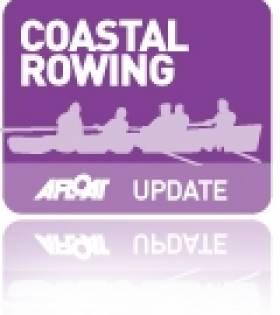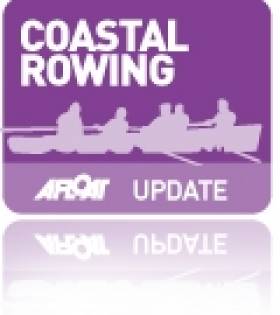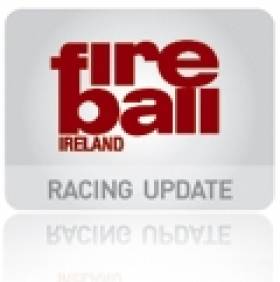Displaying items by tag: barbados
Wicklow sailors Shane McCarthy and Andrew Davis lead the GP14 Worlds in Barbados with two races to go but still any one of three can win the world title later today.
Lighter winds prevailed for Race seven and eight but unfortunately that meant a lot more holes and huge shifts in the air.
Race 7 got under way on time but big shifts caused a bad bend and the gate was restarted. All clean away with Shane & Taxi battling for the lead which they eventually took giving us another new race winner!
Second place was Graham Flynn & Adam Froggatt of Chase with a superb 3rd thrown in by Andrew Clewer & Mark Taylor of Poole YC. Dobson took 9th with Nick Craig seeing his not so best result of 11th.
Race 8 was started under very shifty conditions. So much so that the pathfinder Paul Owen & Sam Pickering of South Staffs were sent on the most massive header that the lined up fleet had to all go in reverse dramatically downwind to try to get behind the guard boat. Loads of boats were left floundering above the gate which then caused serious problems for those who had just about made it. The later gate starters (2mins+ gate left open for 3mins 30secs) were sunk. All sailed on up to the windward mark with many sailors flying red protest flags to protest the committee. A few rounded the windward mark and popped up their spinnakers when eventually (20mins later) the committee boat came up through the fleet and signalled for a restart!! Bit late considering the fleet had sailed the first full beat!
All took a bit of a while to get reassembled back down to the start line and we eventually got going again. Matt Burges & Paul Childs took the second win of the event followed by Shane & Andy, with Iain Dobson and Andy Tunicliffe in 3rd.
Top Ten after 7 races
1st Shane McCarthy Andy Davies 3 3 (9) 3 2 4 1 (25) 16
2nd Nick Craig Tobytastic Lewis5 2 3 2 6 1 (11) (30) 19
3rd Ian Dobson Andy Tunnicliffe2 1 6 (106 DNF) 1 5 9 (130) 24
4th Mike Senior Chris White 7 4 5 1 4 3 (12) (36) 24
5th Matt Burge Paul Childs 1 5 8 11 7 2 (29) (63) 34
6th Sam Watson Andy Thompson 4 15 (25) 4 3 15 4 (70) 45
7th Richard Instone Jim Toothill 12 18 1 (42) 8 7 5 (93) 51
8th Graham Flynn Adam Froggatt 13 (30) 14 20 9 6 2 (94) 64
9th Neil Marsden Derek Hill 17 13 2 (33) 5 10 23 (103) 70
10th Gary Deighan Dale Knowles (28) 12 7 9 16 18 8 (98) 70
After 8 races, results are here
Irishmen Break Ocean Speed Record (and Podcast!)
The Sara G, with Irishmen Rob Byrne and Adam Burke making up a third of the crew, set a new world record today by becoming the fastest boat in the history of ocean rowing.
They rowed the long route across the Atlantic from Morocco to Barbados in 33 days 21 hours and 46 minutes, setting the fastest average speed for the crossing. Less than a day before, Hallin Marine had set a record for rowing the Atlantic east-west of 31 days 23 hours and 31 minutes, but they had crossed from the Canaries to Barbados, a shorter journey.
The Ocean Rowing Society, which is the record keeper for ocean rowing, is set to grant the Sara G the Ocean Rowing Blue Riband trophy for their row.
The crew was Matt Craughwell and Dr Graham Carlin from England, Byrne and Burke from Ireland, Thomas Cremona of Malta and Fiann Paul from
Iceland.
Listen in to a podcast from Barbados with Rob Byrne and Irish Times Rowing Correspondent Liam Gorman.
Rowers Pass Halfway Point in Atlantic Record Attempt
The Sara G and her crew are less than 1,000 miles from Barbados in their attempt to break the world record for the fastest Alantic crossing by an ocean rowing boat.
As previously reported by Afloat.ie, the six-man crew - featuring Irishmen Adam Langton Burke and Rob Byrne - set out from Morocco on 5 January.
And there is already some cause for celebration, as perfect conditions along the route so far have helped the team break another record - that of 10 consecutive days of more than 100 rowed each day.
Click HERE to track the crew's live progress across the Altantic.
Ocean Rowers Begin Atlantic Record Attempt
The crew of the Sara G have begun their latest attempt on the world record for the fastest crossing of the Atlantic by an ocean rowing boat.
The six-man crew - skippered by Sara G owner Matt Craughwell and featuring Irishmen Adam Langton Burke from Skerries and Bray native Rob Byrne - set off from Tarfaya in Morocco on Wednesday afternoon, headed for Barbados.
The 11.1m boat has a storied history, smashing the record for the fastest row across the Tasman Sea from New Zealand to Australia with its previous owner Steven Gates.
Last year the Sara G crossed the Atlantic for the first time from Agadir to Barbados in 57 days, 20 hours. This year's crew must beat a time of 38 days, 1 hour and 22 minutes to take the record held by Team La Mondiale since 2008.
Rowing southwest to take advantage of the trade winds, the Sara G is presently off the coast of north-west Africa near the Canary Islands.
Click HERE to track the crew's live progress across the Atlantic.
Fireball title decided one day out
Among the Irish sailing entries, Neil Spain & Francis Rowan are the leading boat in 21st overall with Noel Butler & Seamus Moore in 26th. These two have kept most of their results in the twenties with each having a mid-teens result and a 30th each as well.
In 35th overall, Messrs Laverty & Butler have scored results mostly in the thirties but with one result in the twenties (27th) and two in the forties. Next up is Smyth/Bradley in 46th with a high of a 31st and a low of a DNF. Their results are consistently in the forties. Frank Miller & Marguerite O'Rourke have not had a good series by their standards and lie in 49th with the last Irish boat Hannah Showell & Martina Michels in 60th.
Other well known combinations are as follows; Derian & Andy Scott (18th), Tim Rush & Russ Clark (9th), Vince Horey/ Sam Brearey (11th) and Heather McFarlane & Chris Payne (17th).
Two races tomorrow (Fri) conclude the series but Howarth/Townend don't look as though they need to sail them both. Prize-giving is scheduled for tomorrow evening.
It has been a physically challenging series even on those days when the wind eased. The fleet has been launching at 11:45ish for a 12:30 start and getting ashore at around 16:30. Most evenings have seen the club environs empty earlyish. Burning the midnight oil in a social context has been the exception rather than the rule!!


























